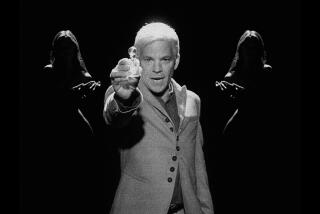Do They Track Box Office in the Afterlife?
- Share via
Film producer Steve Simon has spent 18 years holding onto the rights to a book about love in the afterlife, steadfastly believing in the power of the material. Finally, heaven won’t have to wait much longer.
Interscope Communications Chairman Ted Field has committed to bring to the screen “What Dreams May Come,” based on a 1978 novel by Richard Matheson about a man’s quest to reconnect with his wife in the afterlife after he dies in a car crash.
Robin Williams will star in the $60-million-plus project, which is in early development and not set for release until Thanksgiving 1998. Extensive pre-production will probably mean that the film won’t even start shooting until next September.
Field thinks that “What Dreams May Come” will do for films about the metaphysical and spiritual what Interscope’s 1992 “The Hand That Rocks the Cradle” did for family-invasion movies.
“This story is so strong and the public is so starved for something new, we expect the same kind of reaction could occur with this,” he says.
It’s true that after an early summer of nonstop action films, audiences in recent months have leaned toward quieter or more comedic movies with an uplifting story.
But “What Dreams May Come” won’t be your standard afterlife picture, says Scott Kroopf, Interscope’s head of production.
“No clouds or winged angels or white togas--the way heaven has been visualized in movies in the past,” he says. “This film will go much further.”
Through the years the project attracted the interest of such well-known filmmakers as Steven Spielberg and Wolfgang Petersen, and it resided at one point at 20th Century Fox before being put in turnaround. It finally began to move forward when Simon’s company, Meta Filmics, showed it to Field, who eventually signed on.
Trying to explain the concept without giving away the film’s interpretation of the afterlife, Simon’s partner, Barnet Bain, says: “Most people have a cat or a dog they loved a lot and it died. In this afterlife, that dog would probably be there.”
Field elaborates: “The characters would still have human form. One of the concepts [screenwriter] Ron Bass came up with is having the wife be an artist. She paints their dream house while he’s dying. And when he arrives in Summerland, it is a paint world that becomes the dream house.”
Bass and New Zealand director Vincent Ward (“Map of the Human Heart”) are the two who will shape this afterlife through the use of computer graphics and digital matting, Kroopf says.
Those involved in the project say it isn’t some New Age film or another version of this summer’s hit “Phenomenon.”
“It does have a spiritual quality, but it is not religious. It focuses on the questions we seek in our life, something beyond the world we know and the eternality of love,” Field says.
“In the last couple of years a few movies trickled through like ‘Powder’ or ‘Phenomenon’ or ‘Ghost’ that touch on this subject. But they are not quite the same,” Kroopf says.
He says the film that comes closest in execution to the “Dreams” idea of love transcending death is Michael Powell and Emeric Pressburger’s 1946 British classic “A Matter of Life and Death,” whose title was later changed to “Stairway to Heaven.” The critically acclaimed film starred David Niven as a World War II pilot who claims to a heavenly court that he was mistakenly chosen to die and pleads to get his life back.
“I think the public is looking hard for something different now,” Simon says. “What the 100-year history of this industry tells us is that you can’t just keep recycling the past--the public is too smart.
“We believe there is a need for a new genre that looks at humanity and spirituality. We are shaping the focus of our entire company around it.”
Simon obviously has been bent in that direction for a while. He adapted Matheson’s work before, as a producer on 1980’s “Somewhere in Time,” about a man who falls in love with an old painting of an actress and wills himself back in time 70 years to be with her.
In “Dreams,” Bain says, “the rules are there are no rules. This is not a movie about the afterlife. It is a love story set in an afterlife.”
And that, says Simon, is simply what made it worth the wait.
More to Read
The biggest entertainment stories
Get our big stories about Hollywood, film, television, music, arts, culture and more right in your inbox as soon as they publish.
You may occasionally receive promotional content from the Los Angeles Times.










